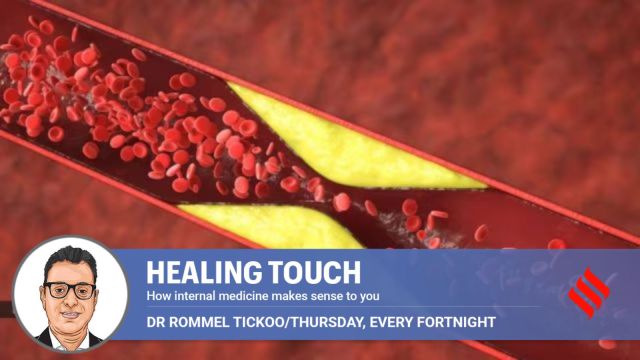My patient replaced LDL cholesterol-lowering drug with garlic pills: How did he develop a heart block?
There is misinformation around the use of statins, which are necessary for those who are genetically prone to high LDL cholesterol
 When you discontinue statins, LDL cholesterol levels rebound and go back to pre-medication levels within a few months. (Representational image/File)
When you discontinue statins, LDL cholesterol levels rebound and go back to pre-medication levels within a few months. (Representational image/File)The other day, I was surprised to see my 50-year-old patient report to the emergency room with angina, which is chest pain caused by reduced blood flow to the heart muscle. He had come to me three years ago, when we found that he had familial hypercholesterolemia, a common genetic condition where the body cannot effectively remove LDL (low-density lipoprotein or bad cholesterol) from the blood. His LDL count was stuck at 190 mg/dL despite dietary and lifestyle controls. That’s why I had prescribed statins, which lower LDL significantly. So, what went wrong?
I came to know that he had stopped taking his cholesterol-lowering drugs the moment his LDL levels had stabilised. Not only that, he had started taking garlic supplements, trusting them to do the heavy lifting. “Doctor, I read about the drug you prescribed and its side effects. So once my counts went down, I gave it up. The herbal alternative seemed safe,” he told me. It is this online misinformation that puts many patients at risk. Stopping drugs had accelerated his LDL levels, leading to plaque deposits that had blocked arteries in his heart.
What are statins?
Statins are a class of drugs that work by inhibiting the liver’s production of LDL cholesterol. They can help remove existing bad cholesterol from the blood between 20 and 60 per cent, depending on the dose, reduce inflammation in the arteries and stabilise plaques. They reduce the risk of cardiovascular events, not just cholesterol. It is proven that for every 38 mg/dL drop in LDL, there is 22 per cent reduction in major cardiac events. The benefits accumulate over time, so in patients with a genetic history or with a high calcium score indicating deposits in the arteries, the earlier the better. As for the effect of garlic supplements, there is no evidence of its efficacy. There have been rigorous studies but none of them LDL-lowering capability compared to statins.
 For those who have already had a heart attack or stroke, stopping statins abruptly can pose a serious risk. (File image)
For those who have already had a heart attack or stroke, stopping statins abruptly can pose a serious risk. (File image)
What are myths about statins?
My patient told me that he had read that statins lead to diabetes and he feared he would develop another risk factor. Statins affect how your body uses insulin, leading to a small increase in blood glucose. But this is true only among those who have prediabetes, that too a very small percentage. But the benefits outweigh the risks and doctors adjust dose and monitor blood glucose in tandem so that the patient stays safe. My patient also feared that statins could trigger dementia, though no scientific evidence backs this yet.
There’s a myth about the drug impacting liver function. Truth is certain patients may report a mild elevation in liver enzymes initially but this is reversible and does not damage the liver. In fact, they reduce inflammation in fatty liver disease. As for muscle aches and pains, only 5 per cent of users report them. Besides, pain can be managed with other medication. Nearly 85 per cent patients have reported no side effects with long-term use.
What happens when you discontinue statins on your own?
When you discontinue statins, LDL cholesterol levels rebound and go back to pre-medication levels within a few months. That’s why my patient needed to be treated for angina. Studies have shown that stopping statins can trigger a worsening of vascular function. Worse, a sudden withdrawal can destabilise plaques, raising the risk of clots and heart attacks.
How to manage your drug protocol?
Always speak with your doctor, explain your side effects and develop a dosage plan. Sometimes the doctor may complement a low dose statin with PCSK9 inhibitors and bempedoic acid which work in a similar manner. For those who have already had a heart attack or stroke, stopping statins abruptly can pose a serious risk.
(Dr Tickoo is Director, Internal Medicine, Max Healthcare)





- 01
- 02
- 03
- 04
- 05


























